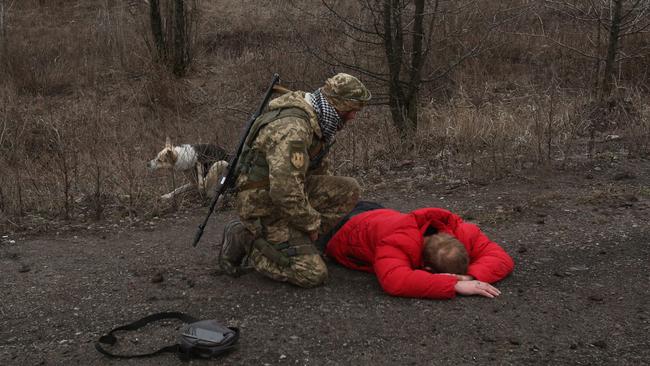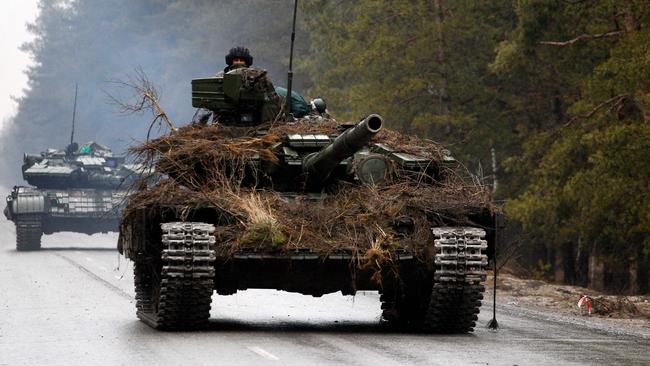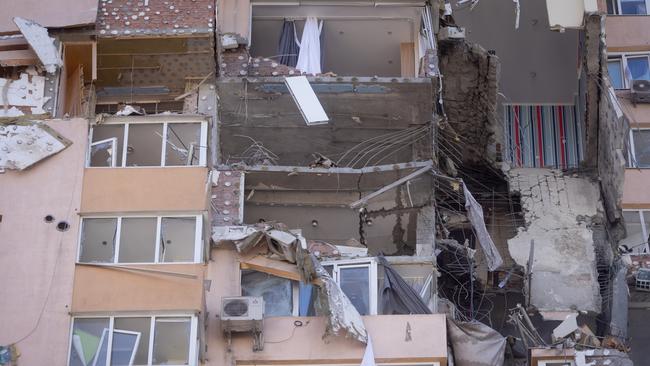Ukrainian volunteers hunt traitors and Kremlin spies as fear grips Kyiv
Fear of attacks from Russian agents behind the lines is spreading like a virus, making deserted streets even more dangerous.

On a sun-bathed boulevard in front of a golden-domed cathedral, three young men lay flat on the ground, their chalk-white faces pressed to the tarmac, arms spread: the latest suspects in a frantic hunt for spies and traitors.
Over them stood a dozen Ukrainian fighters dressed in camouflage uniforms, armed with assault rifles, who had detained the men moments earlier, as they were driving through the city. One of the fighters was rifling through their belongings while another interrogated them.
A policeman in a black flak jacket paused from packing boxes of bullets into the back of a car, and nodded over at the three prostrate figures. “Saboteurs,” he sneered. “Maybe Russian.”
Nobody knew exactly how far away Vladimir Putin’s troops and tanks were but fierce fighting on the outskirts of the capital had kept them in check and on the third day of the Russian advance, Kyiv was still in Ukrainian hands.
Yet as thousands of men with guns – some trained soldiers, others volunteers with only the vaguest idea of how to use their new weapons – bedded in to defend their city, fear of attacks from Russian agents behind the lines spread like a virus and made the otherwise nearly deserted streets even more dangerous and unpredictable.

The mayor, Vitali Klitschko, a former world heavyweight boxing champion, announced a strict curfew from 5pm today until 8am on Monday. Anyone caught outside it, he said, would be considered “members of the enemy’s sabotage and reconnaissance groups”.
Russia’s three-pronged push into the country from the north, south and east slowed in the face of what the Ministry of Defence last night described as “strong Ukrainian resistance”.
In the latest of a series of video messages the Ukrainian president, Volodymyr Zelensky, said that “the real fighting for Kyiv is ongoing”. He accused Russia of hitting infrastructure and civilian targets but promised: “We will win.”
Two civilians were killed and six more were injured when a missile hit a block of flats in the southwest of the capital.
Concrete roadblocks had gone up overnight across the city, blocking off broad avenues which just a few days before had been buzzing with well-dressed people going shopping at department stores and having brunch.
On one central road, a tow truck was parked across the street, blocking traffic. At makeshift checkpoints, fighters let some civilians pass, and hauled others out of cars, questioning them at gunpoint. Among civilians and fighters alike, the dread of infiltrators was palpable. “There’s saboteurs around here. They’re dressed like you, they’re dressed like me,” said the policeman by the cathedral. “We’re looking for them. We found some this morning.”
In blocks of flats, residents climbed onto their roofs to check for suspicious markings after a warning that Russian saboteurs were picking buildings to strike. In WhatsApp groups and Telegram channels, locals sent messages about strangers coming up to them and asking, in Russian, for simple directions to landmarks anyone from Kyiv would know.
Suspicion and paranoia built by the hour, spiralling away from all logic and control.
“I’ve heard they’re everywhere,” said one young woman with rose-pink hair. “They come and talk to you and ask you simple things, they try to attack you. Or they dress like normal people and go around in the city looking for targets.”
Officials said the alarm was justified. On Friday Anna Malyar, the Ukrainian deputy minister of defence, claimed that Russian troops dressed as Ukrainian soldiers had seized two cars and driven right into the centre of the city – tailed by a column of Russian military trucks – before being killed by local forces. Videos purporting to show captured saboteurs, all of them unverified and many speaking under duress, were shared by other Ukrainian officials. Even in the daytime only a few civilians could be seen outside – most walking hurriedly. The one exception was at supermarkets, where queues snaked out of the doors. Schools, cafes and almost all shops – except for those selling essentials – were closed. Each hour seemed to bring more checkpoints, more gunmen.
Trucks full of ammunition rolled down central boulevards, and buses of soldiers and policemen emptied out onto the central squares. Camouflage-clad gunmen carried RPG rounds and mortars, preparing to take them to their battle positions.
All the time, more people were signing up to fight. Some of them looked barely out of their teens. Vladyslav, a 20-year-old economist with a feathery moustache, stood outside a recruitment point in the early spring sunlight, waiting for his assault rifle to be issued.
“I know how to use it,” he insisted, as the sound of shelling boomed dully in the background. “I’m going to fight for my city.”
The situation had been changing by the hour for days, as this buzzing, bohemian city – with its neo-baroque architecture, world-class restaurants and a nightlife that beats Berlin’s – mobilised against the Russian army.
At 10am on Friday, we drove east across a bridge over the Dnieper river, past a makeshift roadblock made of tow trucks pulled across the road, and an APC with rocket artillery on the back. Two armoured vehicles hurtled past us at high speed, heading for the front lines just outside the city.
By the time we returned, around mid-morning, checkpoints were springing up. Ukrainian soldiers were taking firing positions on central roads. At points across Kyiv, men and women – most of whom just a few days before had been commuting to work, lingering in cafes or taking their children to school – were signing up to fight.
Some people were furious at what they saw as a faltering international response from world leaders who held meetings and debated sanctions as Russian forces moved in across the country.
“People need to go on the streets, protest across the world,” said one woman, who asked not to be named. “They can’t forget us. They have to try harder.”
Some civilians were still risking hours of snarled traffic jams under potential bombardment to try to make it out of the city before it was surrounded
Among them were Bruno Manfredi and Mariela Morinari, both 38, and their 11-day-old son, Vito. The couple had come to Ukraine from their home in Buenos Aires before the war began to pick up their baby, who was born to a surrogate. After spending days living in the underground car park of a Kyiv hotel, Vito sleeping between them on a mattress, they had taken the chance to leave in a vehicle organised by the Argentinian embassy. With them were another four couples with newborns. “It’ll be a real story for him to tell,” said Manfredi.
As darkness fell, and streets filled with gunmen in balaclavas, the sound of shells and missiles boomed through the air – mingling with the wail of air raid sirens.

Online, social media messaging chats where groups were organising resistance against the Russian advance turned sour with fear of infiltrators. One address, which had been shared as a place for people to meet and make petrol bombs, turned out to be a dark, empty warehouse, with only one Ukrainian-speaking man standing in the dark doorway.
“It’s fake, it’s fake, you need to leave right away,” he said when we approached. “It’s not safe here.” But in the smoke-wreathed living room of a sixth floor flat, a group of artists were preparing for war.
Rita Burkovska, an actress, was picking up empty bottles of Amarone and Nero d’Avola to make bombs. Alina Gorlova, a director who had been planning to go to Goldsmiths, University of London, this year, was sifting through bags of food bought to cook that evening for troops on the front line.
As they dashed around the room, Ira Nitsha, 31, an actress with a blonde bob, sat back and took a swig of cognac.
“They can’t win,” she said. “They can slaughter us, but they can’t win.”
A group of their friends – a production designer, an administrator, some of them from the LGBTQ community – had signed up to fight that day. They had been given assault rifles and sent out to patrol the city. The three women had gone down to a recruitment point, ready to sign up to fight, but since they didn’t know how to use a gun, were told they should donate blood and cook food for fighters.
All of the people in the flat could have left the city. But they stayed, because they wanted to fight, in whatever way they could, for the city they loved, and for everything they had there: friends, families, late nights, independence, and the anarchic freedom which Kyiv, in peacetime, boils with in every street.
The Times







To join the conversation, please log in. Don't have an account? Register
Join the conversation, you are commenting as Logout